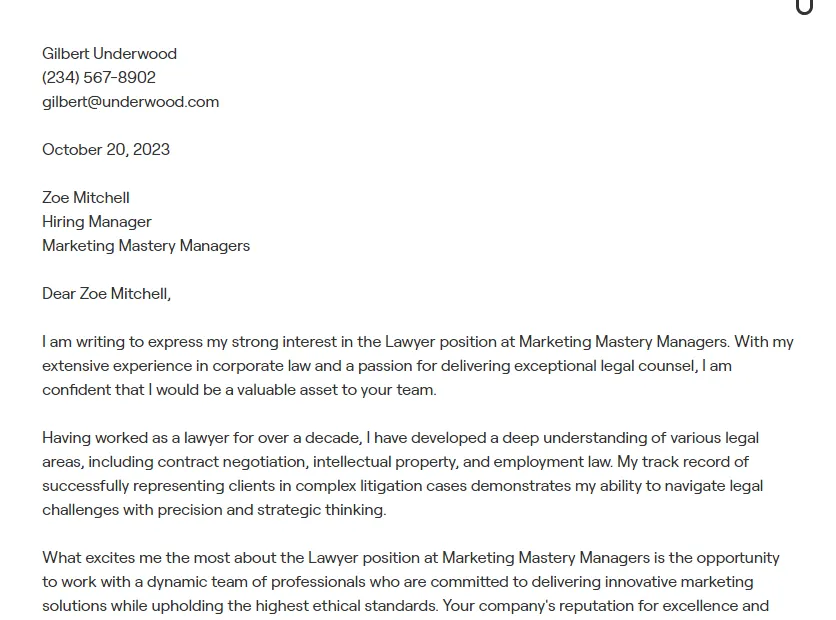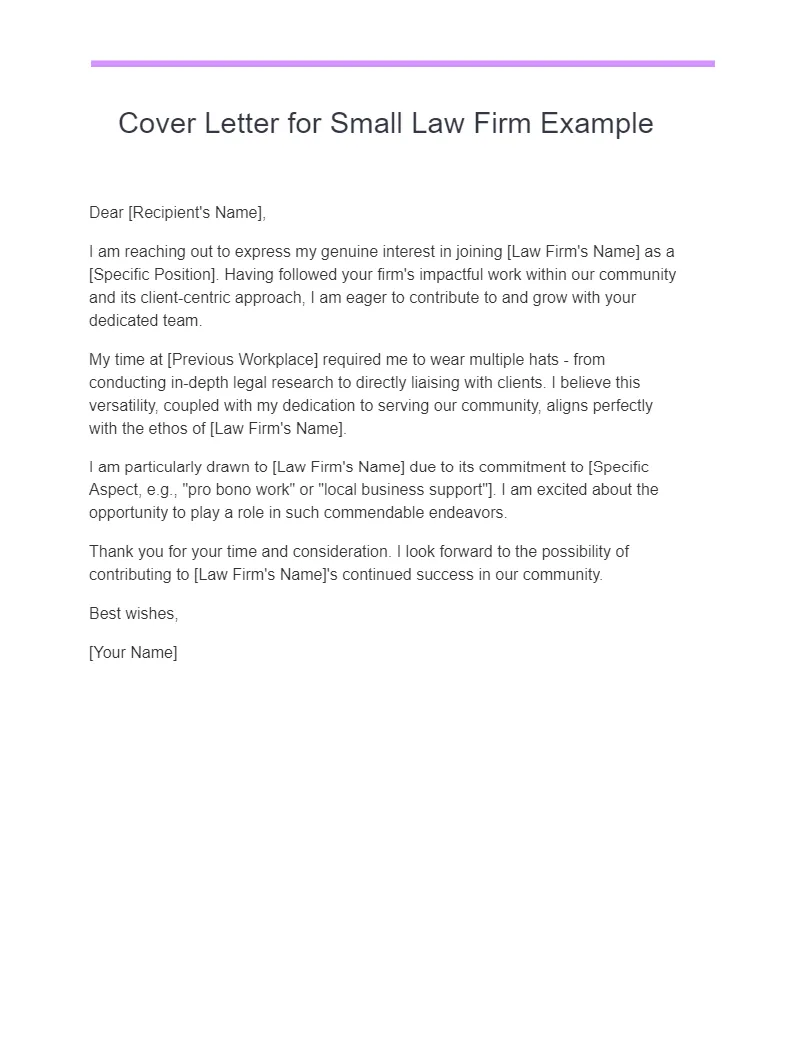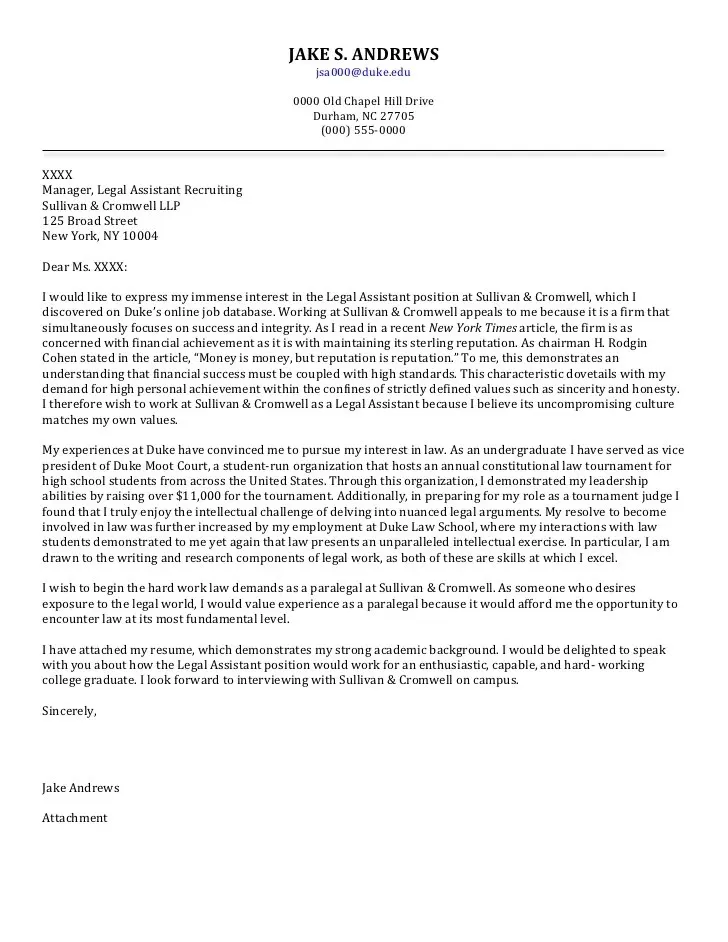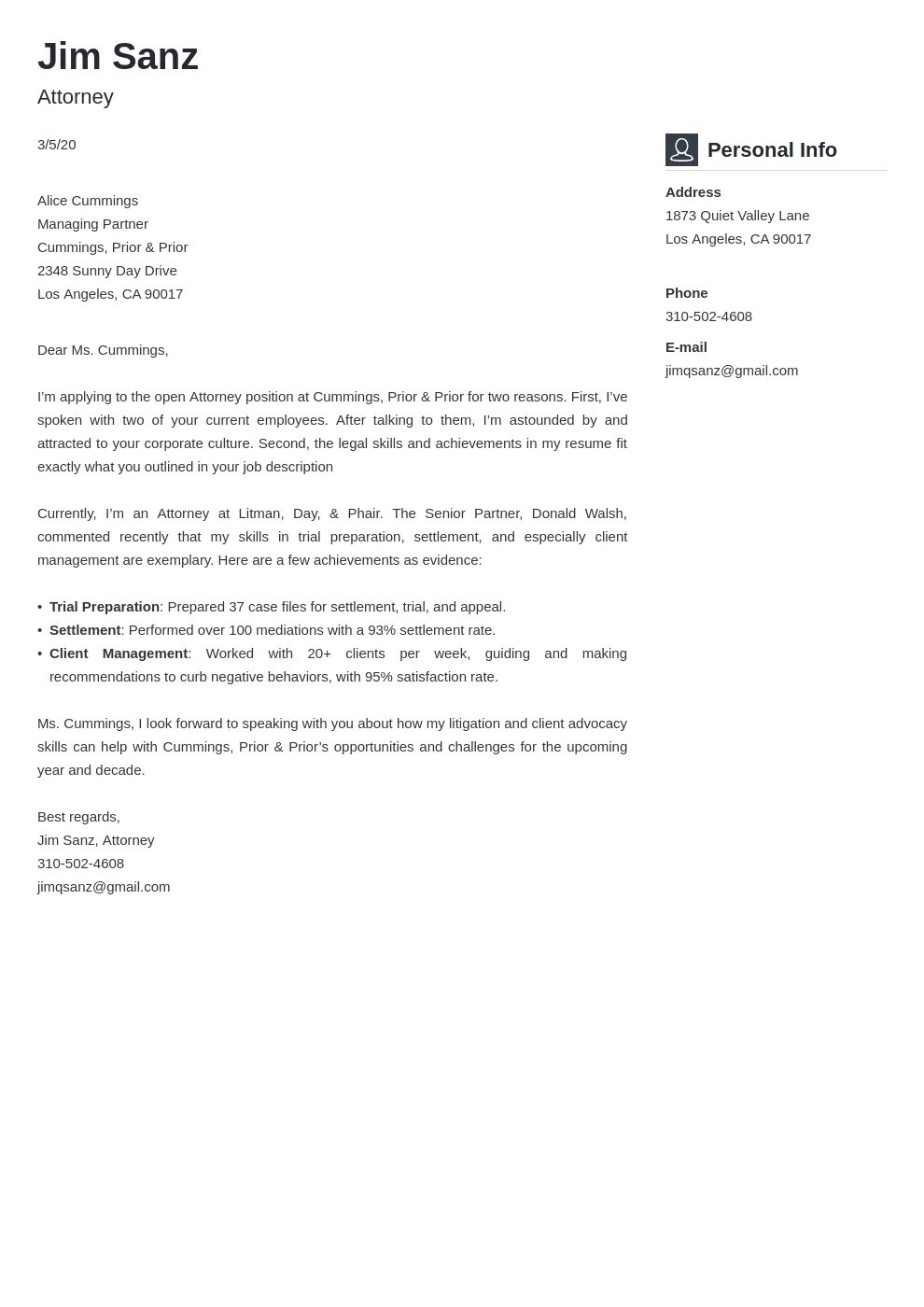Know the Purpose of a Cover Letter
Before you start writing, understand why a cover letter is crucial. It’s not just a formality; it’s your first chance to make a strong impression on a law firm. Your cover letter provides context to your resume, allowing you to highlight specific skills, experiences, and achievements that align with the law firm’s needs. It’s an opportunity to express your personality, enthusiasm, and genuine interest in the firm. A well-crafted cover letter demonstrates your writing skills, attention to detail, and understanding of the legal profession. By clearly articulating your career goals and why you are a good fit, you increase your chances of securing an interview. This document should be considered a sales pitch, designed to convince the reader that you are the perfect candidate. Make every word count and ensure each sentence reinforces your value proposition.
Highlight Your Legal Skills
Law firms seek candidates with specific legal skills. Tailor your cover letter to showcase these. Mention skills like legal research, writing, analysis, negotiation, and litigation, if applicable. Provide concrete examples of how you’ve used these skills effectively. For instance, if you have strong research skills, describe a time you successfully researched a complex legal issue and presented your findings. If you’re proficient in legal writing, mention a compelling legal brief or memo you’ve written. Your cover letter should be a testament to your ability to think critically, solve problems, and communicate clearly. Ensure that you align your skills with the requirements outlined in the job description. Highlight your ability to understand legal concepts, analyze cases, and apply legal principles. Use action verbs to describe your accomplishments, and quantify your achievements whenever possible to make a convincing statement of your abilities.
Research the Law Firm

Demonstrate your genuine interest by researching the law firm thoroughly. Visit their website, review their recent cases, and read about their attorneys. Understand their areas of practice, their values, and any recent achievements. This research allows you to tailor your cover letter to their specific needs. Mention specific cases, projects, or values that resonate with you. This shows that you’ve taken the time to understand the firm’s culture and what they value in their employees. Research also helps you identify who to address your letter to, which adds a personal touch and indicates that you’ve put in extra effort. Showing your knowledge of their work will set you apart from generic applications. Your ability to understand the firm’s place in the legal landscape and its current challenges will be highly valued. Such preparation will make your application more relevant and persuasive. Also, learn about their hiring practices and culture.
Address the Right Person
Addressing your cover letter to the correct person is a crucial step. Whenever possible, find the name of the hiring manager or the partner in charge of recruiting. This shows that you have gone the extra mile. If you can’t find a specific name, research the firm’s website or call to inquire. Avoid generic greetings like “To Whom It May Concern.” Personalizing your letter makes it stand out. If you can’t find a specific person, you can still use a professional and specific title, such as “Hiring Partner” or “Recruiting Manager.” Always double-check the spelling of the recipient’s name and title. Addressing the letter to the right person demonstrates your attention to detail, which is essential in the legal profession. The right approach makes your application more likely to be seen by the person who makes hiring decisions and increases your chances of getting your application noticed.
Craft a Compelling Opening
Your opening paragraph is your first and often only chance to grab the reader’s attention. Start with a strong statement that immediately highlights your interest in the firm and your suitability for the role. Avoid generic opening lines. Instead, personalize your introduction to show your knowledge of the firm or the specific position. Mention something specific that drew you to the firm, such as a recent case, a particular attorney, or a specific area of law. Clearly state the position you are applying for and how you learned about it. Briefly summarize your key qualifications to immediately show your value. Your opening must create a positive impression, demonstrate your writing skills, and entice the reader to continue. A well-crafted opening will encourage them to read your cover letter and, consequently, your resume. The opening sets the tone for the rest of your letter, so make sure it is engaging and informative.
Showcase Relevant Experience

Focus on the legal experience that aligns with the job description. Highlight internships, clerkships, or any legal-related roles you’ve held. Provide specific examples of the tasks you performed and the skills you developed. If you have limited legal experience, emphasize transferable skills from other jobs or experiences. Describe how you used these skills in a legal setting. If you worked on specific cases or projects, briefly mention them and your role in those projects. When describing your experience, use action verbs to demonstrate your accomplishments. Focus on experiences that demonstrate your abilities and expertise. Connect your skills and experience directly to the requirements mentioned in the job posting. Explain the impact of your work to show the value you would bring to the law firm. This section provides concrete evidence of your capability to perform the duties of the position.
Quantify Your Achievements
Whenever possible, quantify your achievements to provide concrete evidence of your success. Instead of simply stating that you “managed” a project, explain the size of the project, its budget, and your specific accomplishments. For example, mention the number of cases you handled or the percentage by which you improved a process. Use numbers to showcase your impact. Quantifiable data allows hiring managers to evaluate your performance more effectively. Quantifying your achievements makes your claims more credible. For instance, if you improved research efficiency, indicate by what percentage you reduced research time. If you worked on a successful case, mention the outcome. By providing specific, measurable results, you make a strong case for your capabilities and the value you can provide to the law firm. Details and metrics make your accomplishments much more convincing.
Demonstrate Your Interest
Clearly express your interest in the law firm and the specific position. Explain why you are attracted to their work, their values, and their culture. This can be done by mentioning specific cases, clients, or practice areas that align with your career goals. Personalize your letter to show you’ve put thought and effort into the application. Show that you have a genuine desire to work at this particular firm. Express your enthusiasm and passion for law and the legal profession. Also, mention how your skills and experience align with the firm’s needs and what you can contribute. Demonstrating your interest increases your chances of getting an interview, and eventually, the job. Mentioning specific attorneys or projects that impress you can make your application stand out and show your commitment.
Proofread and Edit Carefully

Proofread your cover letter meticulously for any errors. Spelling and grammatical mistakes can create a negative impression. Read the letter multiple times, and consider having a friend or mentor review it. Ensure your sentences are clear, concise, and well-structured. Proper grammar and spelling are essential in the legal profession, where attention to detail is paramount. Check for consistency in formatting, font, and style. Pay close attention to punctuation, especially commas and semicolons. Errors can undermine your credibility and suggest a lack of attention to detail. A flawless cover letter shows that you are a professional who takes pride in your work. A well-edited cover letter assures that your message is conveyed effectively. Ensure that all contact information is accurate. Edit for tone, making sure it is professional and appropriate for the firm. Thorough editing shows you are serious about your application.
Formatting Your Cover Letter
Use a professional and easy-to-read font, such as Times New Roman or Arial. Maintain consistent formatting throughout the document. The document should have clear margins, single-spacing, and proper paragraph alignment. Be concise; aim for one page. If possible, keep the letter to three or four paragraphs. Your contact information should be at the top of the letter. Follow the law firm’s application instructions if provided. Use formal business letter format, including the date, the recipient’s name and title, and your closing salutation. Ensure that the letter is visually appealing and easy to read. A well-formatted cover letter demonstrates your attention to detail. The document should include proper spacing and headers. Consider using bullet points to highlight key information. A professional format will increase the letter’s readability and make a positive impression on the hiring manager.
